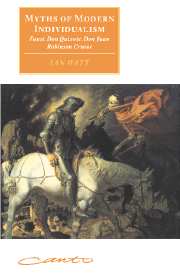Introduction
Published online by Cambridge University Press: 24 November 2009
Summary
In April 1951, I published an essay called “Robinson Crusoe as a myth.” It began:
We do not usually think of Robinson Crusoe as a novel. Defoe's first full-length work of fiction seems to fall more naturally into place with Faust, Don Juan, and Don Quixote, the great myths of our civilization. What these myths are about is fairly easy to say. Their basic plots, their enduring images, all exhibit a single-minded pursuit by the protagonist of one of the characteristic aspirations of Western man. Each of them embodies an arete and a hubris, an exceptional prowess and a vitiating excess, in spheres of action that are particularly important in our culture. Don Quixote, the impetuous generosity and the limiting blindness of chivalric idealism; Don Juan, pursuing and at the same time tormented by the idea of boundless experience of women; Faustus, the great knower, whose curiosity, always unsatisfied, causes him to be damned.
I would not write about those figures in the same way now. My impression of Don Quixote, Don Juan, and Faustus in the Crusoe article was a muddled subliminal form of the Romantic reinterpretation of myths created much earlier. I no longer think that the early Faustus is damned for mere curiosity. I am not sure that Don Juan is actually tormented. I am not even certain that Don Quixote is particularly effective in his generosity. But I still see Don Quixote, Don Juan, Faust, and Robinson Crusoe as powerful myths with a particular resonance for our individualist society.
- Type
- Chapter
- Information
- Myths of Modern IndividualismFaust, Don Quixote, Don Juan, Robinson Crusoe, pp. xiii - xviPublisher: Cambridge University PressPrint publication year: 1996

